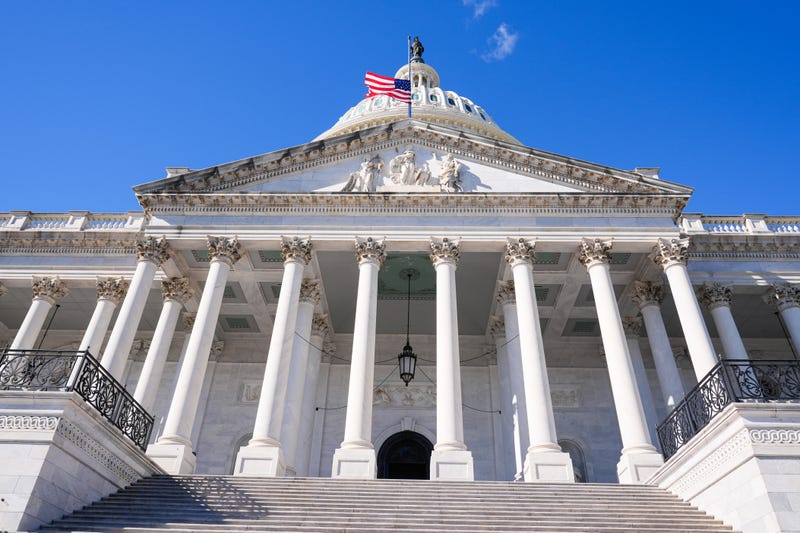
WASHINGTON (AP) — The Senate’s first weekend session since the beginning of the shutdown yielded few signs of progress Saturday as Senate Majority Leader John Thune’s wish for a quick vote never materialized.
The impasse that has lasted 39 days is taking an increasing toll on the country as federal workers go unpaid, airlines cancel flights and SNAP benefits have been delayed for millions of Americans.
Saturday's session got off to a rough start when President Donald Trump made clear he is unlikely to compromise any time soon with Democrats who are seeking a one-year extension of Affordable Care Act tax credits. He said on social media that it is “the worst Healthcare anywhere in the world” and suggested Congress send money directly to people to buy insurance.
Thune said Trump's proposal would not be part of a solution to ending the shutdown, but added “it is a discussion that the president and all of us want to have.” Republican senators who spoke on the Senate floor Saturday generally echoed Trump's assessment.
“I guarantee you every day we keep this system in place is a great day for the health care insurance companies who have been making out literally like bandits every day under Obamacare,” said Sen. Lindsey Graham, R-S.C.
Sen. Ron Wyden, D-Ore., said he welcomed Republicans to the fight when it came to insurance companies, “but that shouldn’t come at the cost of kicking millions off of their health care in January.”
Senate Republican leaders have signaled an openness to an emerging proposal from a small group of moderate Democrats to end the shutdown in exchange for a later vote on the “Obamacare” subsidies, which make coverage more affordable. For those enrolled in Affordable Care Act exchanges, premiums on average are expected to more than double next year if Congress allows the enhanced subsidies to lapse.
Sen. Jeanne Shaheen, D-N.H., who is leading the talks among moderates, said Friday evening that Democrats “need another path forward” after Republicans rejected an offer from Democratic leader Chuck Schumer of New York to reopen the government and extend the subsidies for a year. “We're working on it,” she said.
Moderates continue to negotiate
Shaheen and others, negotiating among themselves and with some rank-and-file Republicans, have been discussing bills that would pay for parts of government — food aid, veterans programs and the legislative branch, among other things — and extend funding for everything else until December or January. The agreement would only come with the promise of a future health care vote, rather than a guarantee of extended subsidies.
It was unclear whether enough Democrats would support such a plan. Even with a deal, Trump appears unlikely to support an extension of the health benefits. House Speaker Mike Johnson, R-La., also said this week that he would not commit to a health vote.
Republican leaders only need five additional votes to fund the government, and the group involved in the talks has ranged from 10 to 12 Democratic senators.
Some Republicans have said they are open to extending the COVID-19-era tax credits as premiums could skyrocket for millions of people, but they want new limits on who can receive the subsidies. They lined up Saturday to take to the Senate floor and argue that subsidies for the plans should be routed through individuals.
“We’re going to replace this broken system with something that is actually better for the consumer,” Graham said.
Republicans eye new package of bills
Trump wants Republicans to end the shutdown quickly and scrap the filibuster, which requires 60 Senate votes for most legislation, so they can bypass Democrats altogether. Vice President JD Vance, a former Ohio senator, endorsed the idea in an online post Saturday, saying Republicans who want to keep the filibuster are “wrong.”
Republicans have rejected Trump’s call, and Thune is eyeing a bipartisan package that mirrors the proposal the moderate Democrats have been sketching out. What Thune, who has refused to negotiate, might promise on health care is unknown.
The package would replace the House-passed legislation that the Democrats have rejected 14 times since the shutdown began Oct. 1. The current bill would only extend government funding until Nov. 21.
A choice for Democrats
A test vote on new legislation could come in the next few days if Thune decides to move forward.
Then Democrats would have a crucial choice: Keep fighting for a meaningful deal on extending the subsidies that expire in January, while prolonging the pain of the shutdown? Or vote to reopen the government and hope for the best as Republicans promise an eventual health care vote, but not a guaranteed outcome.
Schumer on Saturday persisted in arguing that Republicans should accept a one-year extension of the subsidies before negotiating the future of the tax credits.
“Doing nothing is derelict because people will go bankrupt, people will lose insurance, people will get sicker,” Schumer said in a floor speech. “That’s what will happen if this Congress fails to act.”
___
Associated Press writers Seung Min Kim, Joey Cappelletti and Lisa Mascaro contributed to this report.